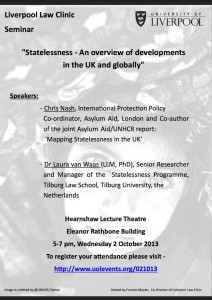- BY Free Movement

Statelessness: call for referrals by Liverpool Law Clinic
THANKS FOR READING
Older content is locked

A great deal of time and effort goes into producing the information on Free Movement, become a member of Free Movement to get unlimited access to all articles, and much, much more
TAKE FREE MOVEMENT FURTHER
By becoming a member of Free Movement, you not only support the hard-work that goes into maintaining the website, but get access to premium features;
- Single login for personal use
- FREE downloads of Free Movement ebooks
- Access to all Free Movement blog content
- Access to all our online training materials
- Access to our busy forums
- Downloadable CPD certificates
The UK is a party to and has ratified both of the Statelessness Conventions. However, until recently there has been inconsistency in approach to those asylum (and other) applicants who are without a nationality, and often a failure to record or even to even notice that there is an issue of statelessness. An excellent joint research project by Asylum Aid and UNHCR (reported on Free Movement here), drew attention to the plight of stateless people living in the UK in 2011. Many of those whose stories are recorded in the report had lived in destitution for years and often had no route out of their predicament: they had reached an unenviable “dead end” of a failed asylum claim with no prospect of documentation and return, nor of making an alternative application.
 The research and report were followed in April 2013 with a moment of “generosity” by the Home Office and the creation of a new procedure for recognising those who are stateless. An important step in the right direction to proper implementation of the Statelessness Conventions of 1954 and 1961, on the face of it the system is relatively straightforward. The Home Office has provided the usual application form to complete and there is no fee to pay. Successful applicants can expect a grant of 2.5 years leave, which can be extended at the end of that period to a total of 5 years, and finally followed by ILR: something most legal representatives would consider a real result for most in this client group. UKBA guidance provides more detail of their planned approach to applications.
The research and report were followed in April 2013 with a moment of “generosity” by the Home Office and the creation of a new procedure for recognising those who are stateless. An important step in the right direction to proper implementation of the Statelessness Conventions of 1954 and 1961, on the face of it the system is relatively straightforward. The Home Office has provided the usual application form to complete and there is no fee to pay. Successful applicants can expect a grant of 2.5 years leave, which can be extended at the end of that period to a total of 5 years, and finally followed by ILR: something most legal representatives would consider a real result for most in this client group. UKBA guidance provides more detail of their planned approach to applications.
Always a sting in the tail of any such move, I’m afraid, and there is an inevitable draw back to the new procedure; there is no legal aid to fund initial applications or appeals (following LASPO), and the application form and UKBA policy both indicate that there is an expectation that applicants will submit detailed documentary evidence of their statelessness.
Liverpool Law Clinic, part of the University of Liverpool, has set up a project which compliments Asylum Aid’s efforts in this area. The Clinic is taking on stateless clients and would like to reach out to all parts of the UK in an effort to assist some of the most vulnerable failed asylum seekers.
Stateless people might originate from almost any country, but to assist you I have set out below the most common ethnic and national origins that might be caught up in the statelessness matrix:
- Palestinian territories (and any Palestinians living anywhere in the Middle East)
- Kuwaiti Bidouns
- Rohingya from Myanmar
- Stateless Kurds from Syria
- Ethnic Jews from Iraq or other countries in the M-East/N Africa
- Nepalis from Bhutan
- Eritrea/Ethiopia
- Roma
Other countries of origin generating stateless people might be:
- Algeria
- Belarus
- Burundi
- Chad
- China
- Eritrea/Ethiopa
- Kenya/Somalia
- Liberia
- Lithuania
- Malaysia (BOCs)
- Mozambique
- Sierra Leone
- Zimbabwe
We are taking on clients immediately, and there are only a small number of client places available for this term.
To mark the launch of Liverpool Law Clinic’s Statelessness project, on 2 October 2013, we are holding a free seminar:
Statelessness: An overview of developments in the UK and globally
We are honoured to confirm the following guest speakers:
- Chris Nash, International Protection Policy Co-ordinator, Asylum Aid, London and Co-author of the joint Asylum Aid/UNHCR report: ‘Mapping Statelessness in the UK’, and
- Dr Laura van Waas (LLM, PhD), Senior Researcher and Manager of the Statelessness Programme, Tilburg Law School, Tilburg University, the Netherlands
Venue:
Hearnshaw Lecture Theatre (adjacent to Liverpool Law Clinic)
Eleanor Rathbone Building
School of Law & Social Justice
University of Liverpool
Bedford Street South
Liverpool L69 7ZA5-7 pm, Wednesday 2 October 2013
Please register in advance if you plan to attend.
SHARE


One Response
this is very interesting to me, particularly as I have recently provided country expert witness reports for two cases involving Western Saharans or Saharawis, whose homeland (Western Sahara) remains a disputed territory and who are strictly stateless. In one case we were successful in securing refugee status, the other is on-going, but the Home Office were clearly baffled by the special status of the Western Sahara and thus of Saharawis. Please include them in your list. I would be interested to maintain contact with those involved in this research/documentation programme